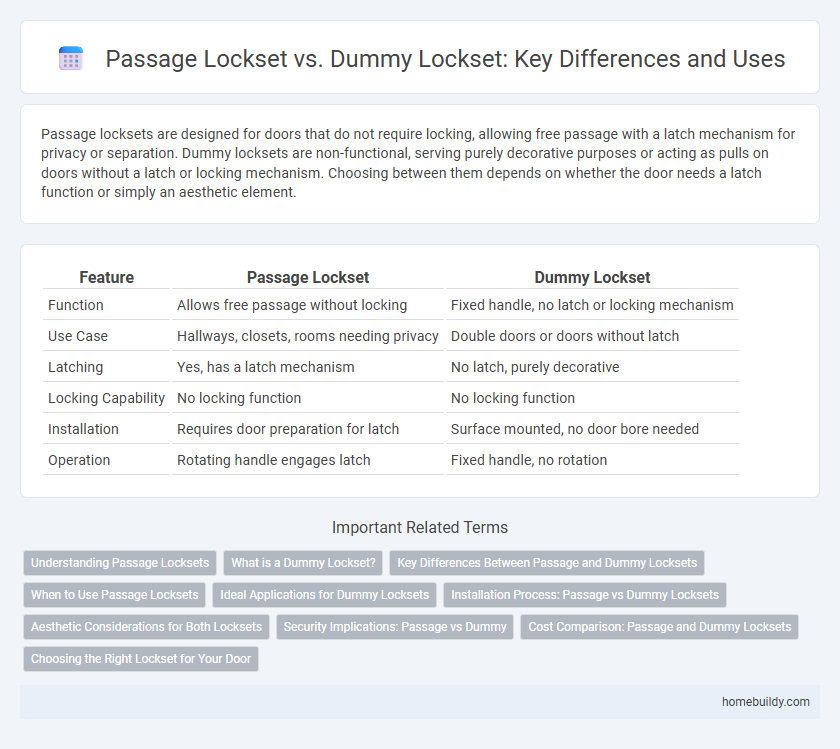Passage locksets are designed for doors that do not require locking, allowing free passage with a latch mechanism for privacy or separation. Dummy locksets are non-functional, serving purely decorative purposes or acting as pulls on doors without a latch or locking mechanism. Choosing between them depends on whether the door needs a latch function or simply an aesthetic element.
Table of Comparison
| Feature | Passage Lockset | Dummy Lockset |
|---|---|---|
| Function | Allows free passage without locking | Fixed handle, no latch or locking mechanism |
| Use Case | Hallways, closets, rooms needing privacy | Double doors or doors without latch |
| Latching | Yes, has a latch mechanism | No latch, purely decorative |
| Locking Capability | No locking function | No locking function |
| Installation | Requires door preparation for latch | Surface mounted, no door bore needed |
| Operation | Rotating handle engages latch | Fixed handle, no rotation |
Understanding Passage Locksets
Passage locksets feature a latch mechanism without a locking function, allowing free entry and exit, making them ideal for interior doors such as hallways and closets. Unlike dummy locksets, which lack a latch and serve purely as decorative handles on doors that do not require latching, passage locksets provide operational usability by allowing door closure without security. The non-locking design of passage locksets supports seamless indoor traffic flow while maintaining door functionality.
What is a Dummy Lockset?
A dummy lockset is a non-functional hardware piece typically used on doors that do not require a latch mechanism, such as closet or pantry doors. Unlike passage locksets, which have operational latches and knobs on both sides, dummy locksets consist of a fixed knob or pull that serves purely decorative or pull purposes. Their installation is surface-mounted without a locking or latching function, making them ideal for doors that don't need security or privacy features.
Key Differences Between Passage and Dummy Locksets
Passage locksets feature a latch mechanism that allows the door to be opened and closed freely without a locking function, making them ideal for interior doors requiring privacy without security. Dummy locksets lack a latch and are purely decorative, commonly used on double doors or closet doors to provide a handle or pull without any operational locking ability. The primary difference lies in functionality: passage locksets offer active door latching, while dummy locksets serve only as non-functional hardware.
When to Use Passage Locksets
Passage locksets are ideal for interior doors that do not require locking, such as hallway or closet doors, allowing free access while providing a consistent appearance throughout a home or office. They enable smooth operation from both sides without any locking mechanism, making them perfect for rooms where privacy is not a concern but convenience and ease of use are important. Unlike dummy locksets, which serve only as decorative pulls on doors without latch mechanisms, passage locksets actively latch the door closed while maintaining unrestricted passage.
Ideal Applications for Dummy Locksets
Dummy locksets are ideal for applications on doors where no actual locking or latching is required, such as closet doors, pantry doors, or decorative double doors. These locksets provide only a pull or push function, enhancing door aesthetics without interfering with door operation. Commonly used in interior spaces, dummy locksets are perfect for doors that need handles but no mechanical locking mechanism.
Installation Process: Passage vs Dummy Locksets
Passage locksets require installation of a latch mechanism that allows free passage without locking, typically involving drilling and aligning the latch with the door frame. Dummy locksets are simpler to install, as they consist of a fixed handle or knob without any latch or locking hardware, making them ideal for closet or cabinet doors. The passage lockset installation demands precise alignment and securing of multiple components, whereas dummy locksets only need basic mounting on one side of the door.
Aesthetic Considerations for Both Locksets
Passage locksets offer a functional design with a built-in latch mechanism, often featuring sleek lever handles that complement modern and traditional interior styles. Dummy locksets prioritize aesthetics without operational components, serving as decorative handles that maintain door symmetry and style, ideal for closets or double doors. Both locksets come in a variety of finishes such as brushed nickel, oil-rubbed bronze, and polished chrome, allowing seamless integration with existing hardware and enhancing overall room decor.
Security Implications: Passage vs Dummy
Passage locksets provide operational functionality with a latch mechanism that allows free entry and exit without locking, suitable for interior doors where security is not a priority but ease of access is essential. Dummy locksets lack a latch and locking mechanism, serving purely decorative or pull purposes on doors such as closets or double doors, offering no security features. Choosing a passage lockset enhances security minimally by enabling door closure, whereas dummy locksets offer no security, making them inappropriate for areas requiring controlled access.
Cost Comparison: Passage and Dummy Locksets
Passage locksets typically cost more than dummy locksets due to their functional mechanics, which include latch mechanisms that allow free passage without locking. Dummy locksets, lacking operational parts, are usually less expensive and serve purely decorative or pull-handle purposes. Prices for passage locksets generally range from $20 to $60, whereas dummy locksets are commonly priced between $10 and $25.
Choosing the Right Lockset for Your Door
Passage locksets provide a latch mechanism without a locking feature, ideal for interior doors that require privacy but no security, such as hallway or closet doors. Dummy locksets serve as decorative pulls without a latch or locking function and are best suited for double doors or closet doors that do not need to latch closed. Selecting the right lockset depends on the door's function, security needs, and whether locking or purely aesthetic hardware is required.
Passage lockset vs Dummy lockset Infographic

 homebuildy.com
homebuildy.com